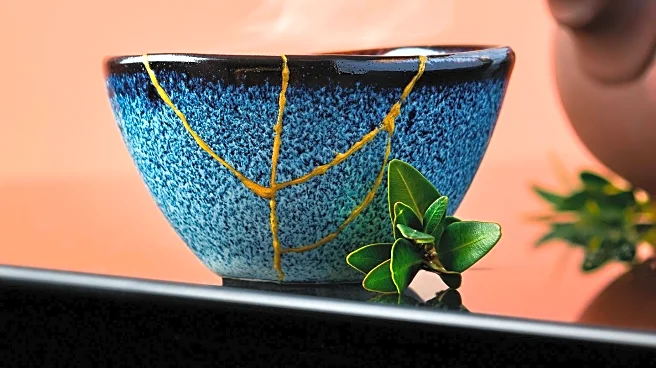What's Happening?
Masaoki Sen, a former kamikaze pilot during World War II who later became a grandmaster of the Urasenke tea ceremony school, passed away at the age of 102 in Kyoto, Japan. Sen was renowned for his efforts to promote peace through the art of tea ceremonies, a practice deeply rooted in Zen Buddhism. After inheriting the title of grandmaster from his father in 1964, Sen traveled globally, advocating for peace and sharing his wartime experiences. He was known for his phrase 'peacefulness through a bowl of tea,' which encapsulated his mission to use the tea ceremony as a diplomatic tool to foster global harmony.
Why It's Important?
Masaoki Sen's life and work highlight the transformative power of cultural practices in promoting peace and reconciliation. His unique approach to diplomacy through the tea ceremony provided a platform for dialogue and understanding across different cultures. Sen's legacy serves as a reminder of the potential for traditional arts to contribute to global peace efforts, offering a non-confrontational means of addressing historical conflicts and fostering mutual respect. His passing marks the end of an era for the Urasenke school and the broader community of tea ceremony practitioners who continue to uphold his vision of peace.
What's Next?
The Urasenke school, one of Japan's three main tea ceremony schools, will likely continue to honor Masaoki Sen's legacy by promoting peace through its teachings. As the school transitions to new leadership, it may seek to expand its international outreach, furthering Sen's mission of peace through cultural exchange. The global community of tea ceremony practitioners may also reflect on Sen's contributions, potentially inspiring new initiatives that leverage traditional arts for diplomatic purposes.
Beyond the Headlines
Masaoki Sen's story underscores the broader cultural and ethical dimensions of using traditional practices for peacebuilding. His approach challenges conventional diplomatic methods, suggesting that cultural heritage can play a significant role in addressing global issues. This perspective may influence future discussions on the integration of cultural diplomacy in international relations, encouraging policymakers to consider non-traditional avenues for conflict resolution.









